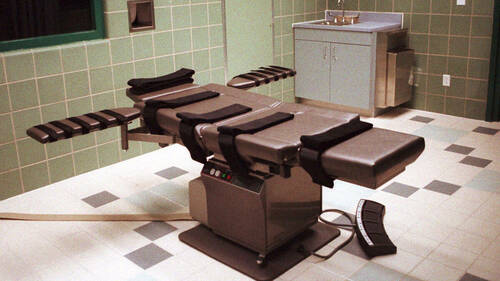
‘This final opportunity to act humanely in the cause of upholding the sanctity of life’
Citing the teachings of the Catholic Church, University of Notre Dame President Rev. John I. Jenkins, C.S.C., called today on President Donald J. Trump to commute the scheduled executions of death row inmates next week, including a woman on Tuesday, at the federal penitentiary in Terre Haute, Indiana. (Full statement is here.)
Lisa Montgomery is scheduled to die by lethal injection for the December 2004 murder of a pregnant Missouri woman. According to experts and her attorneys, Montgomery had a long history of being abused and of subsequent mental illness. Advocates for her also cite questions about the quality of the legal counsel she received. If the execution takes place, Montgomery would be the first woman to be executed in the United States since 1953 and only the third since 1900. Father Jenkins said that Montgomery’s death would not end the suffering of the family and friends of Bobbie Jo Stinnett, her victim, or of the other victims of prisoners currently on death row.
“Her execution is one of three in my home state of Indiana in the coming week, which will bring to 13 the number of individuals executed by the federal government in the last six months,” Father Jenkins said in his statement. “President Trump, whose administration has expressed a commitment to defend the sanctity of human life, has the power to stop this inhumane, unprecedented and unnecessary spree of executions pursued by his Justice Department in the waning days of his administration. I urge him to do so.”
After many years of consideration, the Catholic Church has deemed capital punishment inadmissible under any circumstances and called upon “Catholics and all people of goodwill to work for its abolition everywhere in the world,” Father Jenkins said.
The Montgomery case “illustrates some of the many systemic failures in our system of capital punishment,” Father Jenkins said. In addition to the abuse she suffered as a child and the questions concerning the quality of counsel she received from public defense attorneys, Father Jenkins pointed to data showing that “defendants charged with killing a white victim are far more likely to be executed than when the victim is Black. He added that “no compelling evidence exists that the threat of the death penalty is an effective deterrent against future crimes.”
But, he said the most fundamental objection to the death penalty is that it “undermines our commitment to the sanctity of all human life — healthy or infirm, talented or ordinary, good or bad. Death row inmates have been convicted of some of the most awful crimes imaginable, yet even their lives do not lose that dignity. As the Catechism of the Catholic Church states, there are ways to safeguard the common good that do not involve an ‘attack on the inviolability and dignity of the person.’ To the extent that we accept the killing done by the state in our name, we are all complicitous, and we are all brutalized.”
The Notre Dame president concluded his statement with another appeal to Trump: “You have pardoned many in your last days in power. Please take this final opportunity to act humanely in the cause of upholding the sanctity of life. And I call on all Catholics and everyone of goodwill, regardless of faith, to work to end capital punishment in Indiana, the United States and the rest of the world.”